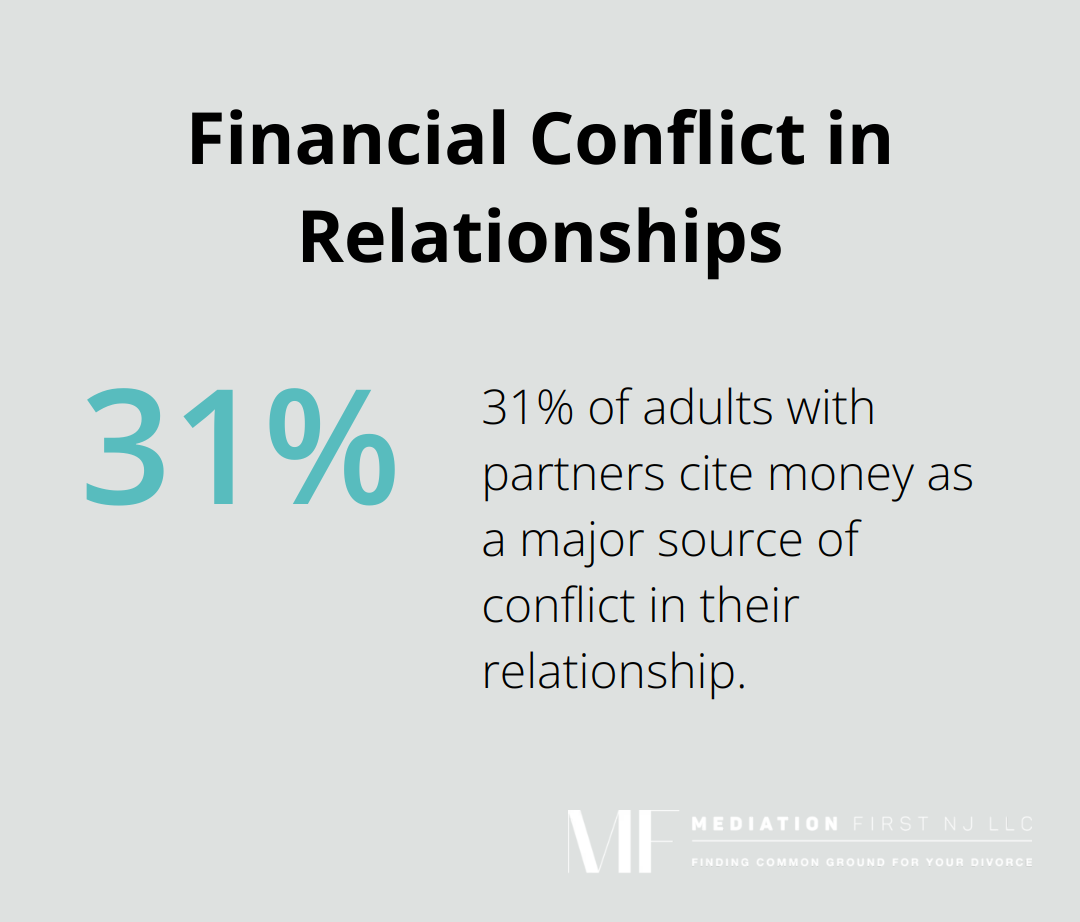Marriage is hard, and even the strongest relationships face challenges. At Mediation First NJ LLC, we’ve seen countless couples struggle with communication breakdowns, financial stress, and evolving expectations.
When these issues become insurmountable, divorce often follows – a process that can be emotionally and legally complex. However, there’s a way to navigate this difficult transition more smoothly.
Why Modern Marriages Face Unique Challenges
The Communication Conundrum
Effective communication forms the foundation of a healthy marriage, yet it often becomes the first casualty in today’s busy lifestyle. Many couples struggle to find quality time for meaningful conversations, which leads to misunderstandings and resentment. Research explores the role of communication patterns, motivation for conjugality, cohesion and flexibility within couples.
Financial Friction
Money matters remain a leading cause of marital discord. The American Psychological Association reports that 31% of adults with partners cite money as a major source of conflict in their relationship. From differing spending habits to disagreements over financial goals, these issues create significant tension (and often lead to heated arguments).

The Work-Life Tightrope
Balancing career ambitions with family life presents an ongoing challenge for many couples. Long work hours, high-stress jobs, and the blurring of work-home boundaries in the age of remote work leave little energy for nurturing a marriage.
Evolving Expectations
As individuals grow and change, their expectations of marriage also shift. What seemed acceptable or desirable at the start of a relationship may no longer align with personal goals or values years later. This mismatch in expectations often leads to feelings of dissatisfaction and disconnection.
External Pressures
Modern couples face unprecedented external pressures that can strain their relationships. Social media creates unrealistic expectations of “perfect” marriages, while societal norms and family expectations (sometimes conflicting) add additional stress. The constant connectivity of the digital age also makes it difficult for couples to truly disconnect and focus on their relationship.
These challenges require open communication, mutual respect, and often, professional guidance. When couples find themselves unable to resolve these issues on their own, they may benefit from exploring alternative dispute resolution methods. Mediation, for example, offers a constructive path forward, whether to strengthen the marriage or to navigate a separation amicably. But what happens when these challenges become insurmountable, and couples decide to part ways?
The Hidden Costs of Divorce
Emotional and Psychological Impact
Divorce often inflicts severe and long-lasting emotional wounds. Studies report that married individuals with higher levels of distress, alcohol use, or psychiatric disorders are more likely to experience divorce. This emotional upheaval affects job performance, parenting abilities, and overall quality of life (impacting various aspects of daily functioning).
Legal Complexities
The legal aspects of divorce overwhelm many individuals unfamiliar with family law. From paperwork filing to understanding state-specific regulations, the process confuses and consumes time. In New Jersey, the divorce process typically lasts 6 to 12 months, but complex cases extend for years (according to data from the New Jersey Courts).
Financial Ramifications
Asset division represents only one piece of the financial puzzle in divorce. The Institute for Divorce Financial Analysts reports that the average cost of divorce in the United States ranges from $15,000 to $20,000. However, this figure fails to account for long-term financial impacts such as decreased retirement savings, reduced income, and potential career setbacks (which can persist for years after the divorce finalizes).

Co-Parenting Challenges
Divorce introduces a new set of challenges for couples with children. Establishing custody arrangements, creating parenting plans, and maintaining consistent communication prove difficult, especially when emotions run high. Research from the American Psychological Association suggests that children of divorce face increased risks of behavioral problems, lower academic achievement, and difficulties in future relationships.
Social and Familial Repercussions
The ripple effects of divorce extend beyond the immediate family unit. Friends and extended family members often feel compelled to “choose sides,” leading to strained relationships and a reduced support network. This social upheaval compounds the emotional stress of the divorce process and can lead to feelings of isolation for both parties involved.
Mediation offers a structured, collaborative environment to navigate these complex issues. This approach reduces emotional stress and financial strain while prioritizing the well-being of all family members involved. The next section explores how mediation simplifies the divorce process and mitigates many of these hidden costs.
How Mediation Transforms Divorce
A Collaborative Approach to Resolution
Mediation promotes open communication between divorcing spouses, creating a space for constructive dialogue. Unlike adversarial court proceedings, mediation encourages parties to work together to find mutually beneficial solutions. This collaborative environment often results in more creative and personalized agreements that address the unique needs of each family.
Significant Cost Savings
The financial burden of divorce can be substantial, but mediation offers a more cost-effective alternative to traditional litigation. A study found that the total net cost savings per year of Family Recovery Program operations was nearly $1,004,456, or approximately $5,022 per family served. This reduction in expenses allows couples to preserve more of their assets for future needs (rather than depleting resources on legal fees).
Expedited Resolution
Time matters in divorce proceedings, and mediation can significantly speed up the process. While litigated divorces can extend for months or even years, mediated divorces typically resolve in a fraction of that time. A study published in the Journal of Divorce & Remarriage showed that mediated divorce cases were more durable than litigated and negotiated cases amongst cases with children.
Emotional Well-being and Future Relationships
The emotional toll of divorce is undeniable, but mediation can help mitigate some of this stress. Mediation creates a more positive atmosphere for resolution by focusing on problem-solving rather than blame. Research from the University of Virginia School of Law indicates that couples who choose mediation report higher levels of satisfaction with the process and outcomes (and are more likely to maintain amicable relationships post-divorce).
Tailored Solutions for Unique Family Dynamics
Mediation provides a structured yet flexible approach to divorce that addresses the legal, financial, and emotional aspects of separation. This process allows couples to craft solutions that fit their specific circumstances, rather than relying on one-size-fits-all court decisions. Mediators work with families to develop customized parenting plans, financial arrangements, and other agreements that reflect the unique needs and values of each family unit.

Final Thoughts
Marriage is hard, and modern couples face numerous challenges that can lead to divorce. Communication breakdowns, financial stress, and evolving expectations strain even the strongest relationships. When couples decide to part ways, they encounter a complex process filled with legal intricacies, financial implications, and emotional turmoil.
Mediation offers a transformative approach to divorce, addressing many challenges couples face during separation. It promotes open communication, reduces costs, and allows for personalized solutions that simplify the divorce process and minimize emotional stress for all parties involved. Mediation creates a confidential and respectful environment where couples can work together to reach mutually acceptable agreements on issues such as asset division, child custody, and support.
At Mediation First NJ LLC, we guide New Jersey families through divorce and other family-related disputes. Our professional mediation services provide a cost-effective and less adversarial alternative to traditional litigation (which often prolongs conflict). If you face marital difficulties or consider divorce, seeking professional mediation services can lead to smoother transitions and more satisfactory outcomes.

